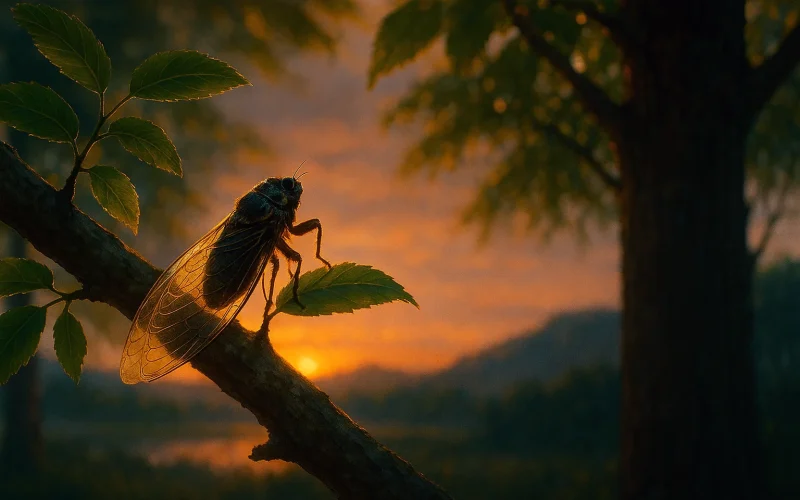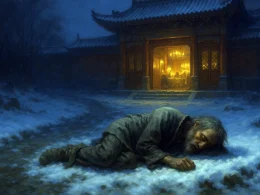When this melody for the flageolet was made by Lady Ts'ai,
When long ago one by one she sang its eighteen stanzas,
Even the Tartars were shedding tears into the border-grasses,
And the envoy of China was heart-broken, turning back home with his escort.
...Cold fires now of old battles are grey on ancient forts,
And the wilderness is shadowed with white new-flying snow.
...When the player first brushes the Shang string and the Chueh and then the Yu,
Autumn-leaves in all four quarters are shaken with a murmur.
Tung, the master,
Must have been taught in heaven.
Demons come from the deep pine-wood and stealthily listen
To music slow, then quick, following his hand,
Now far away, now near again, according to his heart.
A hundred birds from an empty mountain scatter and return;
Three thousand miles of floating clouds darken and lighten;
A wildgoose fledgling, left behind, cries for its flock,
And a Tartar child for the mother he loves.
Then river waves are calmed
And birds are mute that were singing,
And Wu-chu tribes are homesick for their distant land,
And out of the dust of Siberian steppes rises a plaintive sorrow .
...Suddenly the low sound leaps to a freer tune,
Like a long wind swaying a forest, a downpour breaking tiles,
A cascade through the air, flying over tree-tops.
...A wild deer calls to his fellows. He is running among the mansions
In the corner of the capital by the Eastern Palace wall.
Phrenix Lake lies opposite the Gate of Green Jade;
But how can fame and profit concern a man of genius?
Day and night I long for him to bring his lute again.
Original Poem
「听董大弹胡笳弄兼寄语房给事」
李颀
蔡女昔造胡笳声,一弹一十有八拍。
胡人落泪沾边草,汉使断肠对归客。
古戍苍苍烽火寒,大荒沉沉飞雪白。
先拂商弦后角羽,四郊秋叶惊槭。
董夫子,通神明,深山窃听来妖精。
言迟更速皆应手,将往复旋如有情。
空山百鸟散还合,万里浮云阴且晴。
嘶酸雏雁失群夜,断绝胡儿恋母声。
川为净其波,鸟亦罢其鸣。
乌孙部落家乡远,逻娑沙尘哀怨生。
幽音变调忽飘洒,长风吹林雨堕瓦。
进泉飒飒飞木末,野鹿呦呦走堂下。
长安城连东掖垣,凤凰池对青琐门。
高才脱略名与利,日夕望君抱琴至。
Interpretation
This poem depicts the superb artistry of musician Dong Da's performance of "Eighteen Songs of a Nomad Flute" (胡笳十八拍 Hújiā Shíbā Pāi), while expressing the deep mutual understanding between the poet and Imperial Counselor Fang. Originally composed by Cai Yan (蔡琰 Cài Yǎn, also known as Cai Wenji) to express homesickness through music, this solemn melody is masterfully recreated by Dong Da. The poet uses this performance to capture musical beauty, praise Dong Da's skill, and reflect Imperial Counselor Fang's refined taste.
First Couplet: "蔡女昔造胡笳声,一弹一十有八拍。"
Cài nǚ xī zào hújiā shēng, yī tán yī shí yǒu bā pāi.
Lady Cai once created the Nomad Flute's song, Each performance completes eighteen melodic sections.
The opening establishes the musical heritage of "Eighteen Songs", setting the poem's central theme.
Second Couplet: "胡人落泪沾边草,汉使断肠对归客。"
Hú rén luò lèi zhān biān cǎo, Hàn shǐ duàn cháng duì guī kè.
Nomads weep tears that wet frontier grasses; Han envoys heartbroken face returning travelers.
Listeners' reactions demonstrate the music's emotional power, creating a mournful atmosphere.
Third Couplet: "古戍苍苍烽火寒,大荒沉沉飞雪白。"
Gǔ shù cāng cāng fēnghuǒ hán, dà huāng chén chén fēi xuě bái.
Ancient frontier bleak with cold beacon fires; Vast wilderness heavy with flying white snow.
The desolate border scenery harmonizes with the flute's melody, intensifying its poignancy.
Fourth Couplet: "先拂商弦后角羽,四郊秋叶惊槭。"
Xiān fú shāng xián hòu jué yǔ, sì jiāo qiū yè jīng qī.
First brushing Shang notes, then Jue and Yu modes, Autumn leaves tremble in surrounding fields.
Depicts playing techniques, showcasing the musician's mastery.
Fifth Couplet: "董夫子,通神明,深山窃听来妖精。"
Dǒng fūzǐ, tōng shénmíng, shēn shān qiè tīng lái yāojīng.
Master Dong's art communicates with spirits; Even mountain demons come secretly listening.
Hyperbole emphasizes Dong's extraordinary skill.
Sixth Couplet: "言迟更速皆应手,将往复旋如有情。"
Yán chí gèng sù jiē yìng shǒu, jiāng wǎng fù xuán rú yǒu qíng.
Slow speech then swift all respond to his hands; Melodic returns and spirals seem impassioned.
Delicately portrays Dong's consummate technique.
Seventh Couplet: "空山百鸟散还合,万里浮云阴且晴。"
Kōng shān bǎi niǎo sàn hái hé, wàn lǐ fú yún yīn qiě qíng.
Empty mountain's birds scatter then regroup; Thousand-mile clouds shift between shade and sun.
Natural imagery metaphors convey the music's dynamism.
Eighth Couplet: "嘶酸雏雁失群夜,断绝胡儿恋母声。"
Sī suān chú yàn shī qún yè, duàn jué hú ér liàn mǔ shēng.
Like lost goslings' sour cries at night, Or severed nomad children's calls for mothers.
Further reveals the music's heartbreaking emotions.
Ninth Couplet: "川为净其波,鸟亦罢其鸣。"
Chuān wéi jìng qí bō, niǎo yì bà qí míng.
Rivers still their waves, Birds cease their songs.
Personification demonstrates the music's mesmerizing power.
Tenth Couplet: "乌孙部落家乡远,逻娑沙尘哀怨生。"
Wūsūn bùluò jiāxiāng yuǎn, Luósuō shāchén āiyuàn shēng.
Wusun tribes far from homeland; Lhasa's dust bears sorrowful regrets.
Borderland imagery deepens the musical theme.
Eleventh Couplet: "幽音变调忽飘洒,长风吹林雨堕瓦。"
Yōu yīn biàn diào hū piāo sǎ, cháng fēng chuī lín yǔ duò wǎ.
Somber tones suddenly shift and scatter, Like wind through woods, rain on roof tiles.
Describes melodic transition from deep to bright.
Twelfth Couplet: "进泉飒飒飞木末,野鹿呦呦走堂下。"
Jìn quán sà sà fēi mù mò, yě lù yōu yōu zǒu táng xià.
Springs rush swiftly past treetops; Wild deer call softly beneath the hall.
Nature scenes reflect the music's ethereal beauty.
Thirteenth Couplet: "长安城连东掖垣,凤凰池对青琐门。"
Cháng'ān chéng lián dōng yè yuán, fènghuáng chí duì qīng suǒ mén.
Chang'an city connects to Eastern Wall; Phoenix Pool faces Blue-Gate Palace.
Shifts to Counselor Fang's residence, implying his noble status.
Fourteenth Couplet: "高才脱略名与利,日夕望君抱琴至。"
Gāo cái tuō lüè míng yǔ lì, rì xī wàng jūn bào qín zhì.
The noble talent disregards fame and wealth, Daily awaiting your lute-bearing arrival.
Fang's appreciation of music expresses the rarity of true connoisseurs.
Overall Appreciation
Through vivid descriptions, the poem perfectly manifests the artistic conception of music. The first half portrays the solemnity and emotional power of "Eighteen Songs", while the latter half depicts Dong Da's superb artistry. The poet skillfully employs natural imagery to transform auditory art into visual and tactile experiences, enhancing the music's impact. While praising Dong's skill, the poem implicitly compliments Counselor Fang and expresses the poet's own longing for kindred spirits.
Writing Characteristics
- Scenic Musical Metaphors: By describing frontier landscapes and seasonal changes, the poem materializes abstract music into concrete imagery, allowing readers to "see the sounds and hear the scenes".
- Contrastive Progression: From Cai Wenji to Dong Da, from desolate frontiers to elegant courts, from mournfulness to brightness, the music's layered complexity is fully revealed.
- Emotional Symbolism: While extolling Dong's artistry, the poet uses Counselor Fang's character to express lamentations about rare true understanding.
Insights
This poem transcends musical description to become an ode to rare mutual understanding. Dong Da's exquisite artistry makes the poet sigh that most only hear the sounds without comprehending their deeper meaning. Counselor Fang's refined detachment resonates with the poet, showcasing genuine spiritual communion. The work reminds us that true art requires profound appreciation, and that human resonance represents art's highest fulfillment.
Poem translator
Kiang Kanghu
About the Poet

Li Qi (c. 690 - 753 AD) . A renowned Tang dynasty poet, Li Qi traced his ancestral roots to Zhao Commandery (present-day Zhao County, Hebei) but resided primarily in Yingyang (modern Dengfeng, Henan). Li Qi excelled in five- and seven-character verse forms, particularly frontier poems and musical poetry. He maintained close friendships with literary giants like Wang Wei, Gao Shi, and Wang Changling, later being grouped with them as one of the "Four Masters of High Tang" (Gao, Cen, Wang, and Li).












